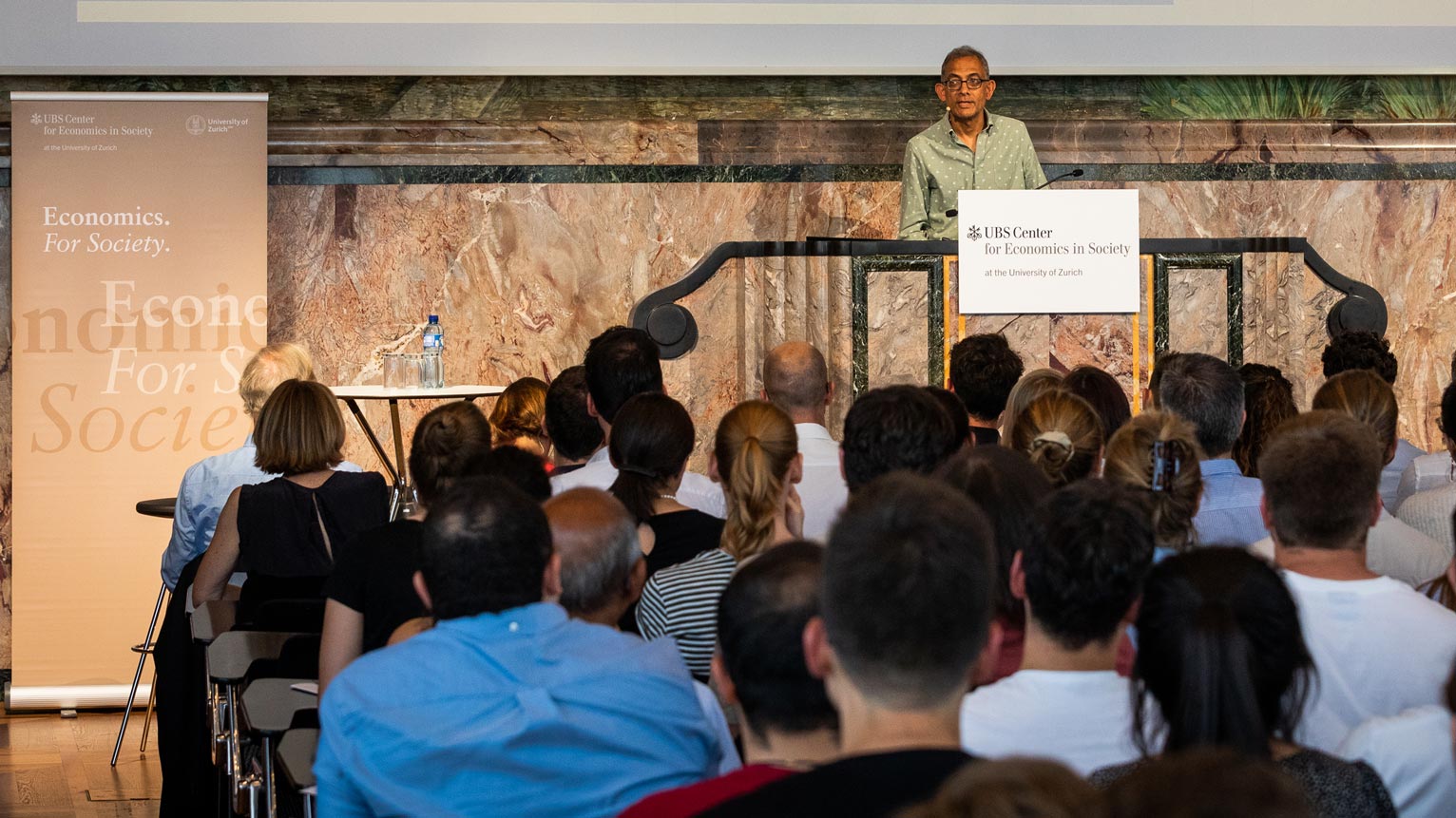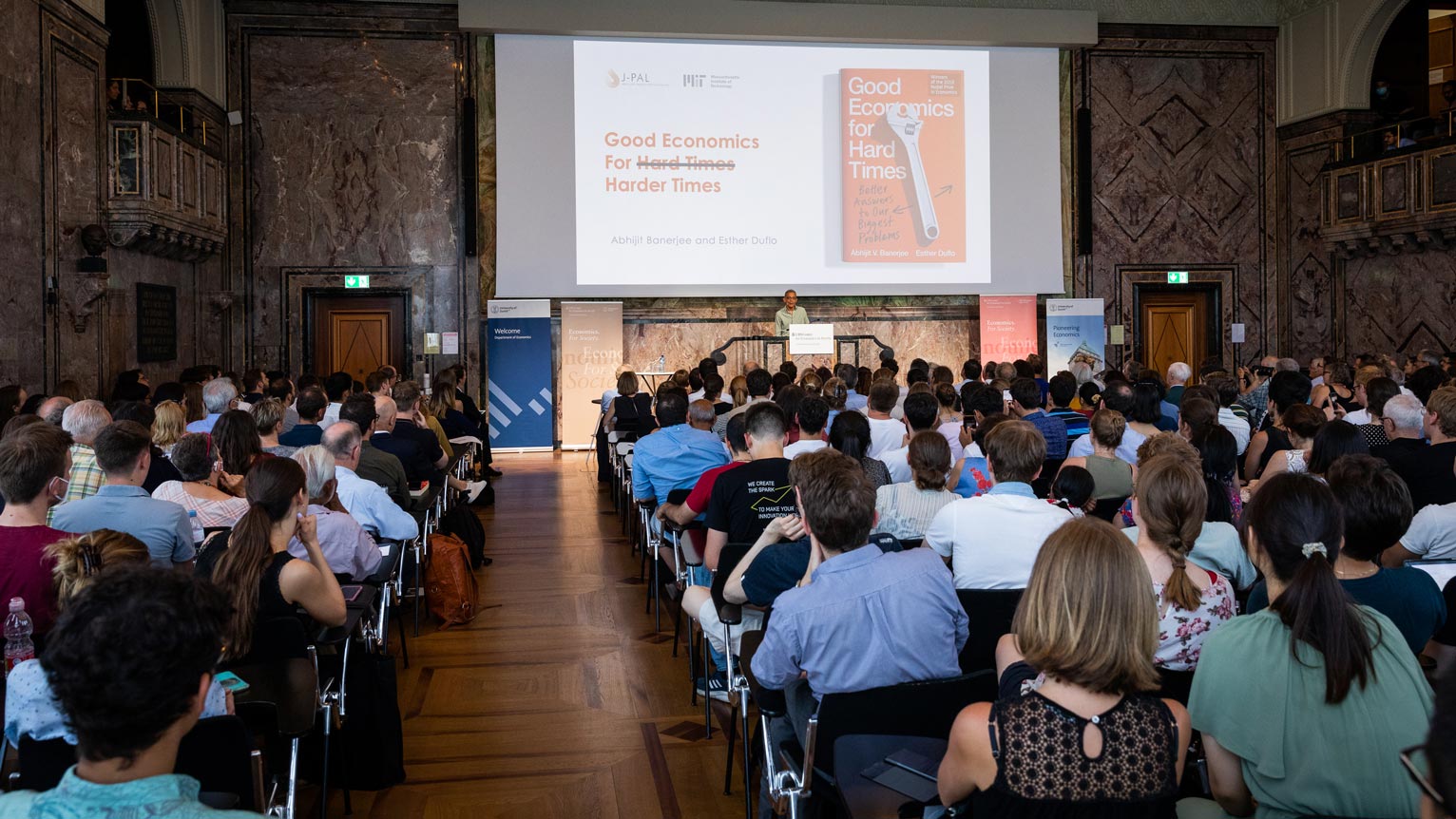Better answers to our biggest problems
Economists should work less like physicists and more like craftsmen, says Nobel laureate Abhijit Banerjee. They could help solve global problems - but they would first have to win back the public's trust.
This interview by Jannik Belser and Lukas Leuzinger was originally published in German by Swiss monthly «Schweizer Monat», 30 September 2022. Translated and edited for layout purposes by the UBS Center.
Mr. Banerjee, numerous challenges currently threaten economic growth. What are you worried about?
At the moment, the consequences of the pandemic and the Ukraine war, as well as high raw material prices, are major economic challenges. In addition, there is the massive tightening of monetary policy in the U.S. When the U.S. Federal Reserve tightens the reins, the money flows back to the U.S., which leads to a devaluation of currencies in developing countries. At least, that is the usual pattern.
Are the prospects for developing countries particularly dark?
Developing countries suffered most from the economic consequences of the pandemic: India, for example, had negative growth of 24 percent in one quarter in 2020, possibly a negative record. We expected that recovery would follow in spring 2022. But we suddenly found ourselves in the midst of a double shock, the Ukraine crisis combined with the tightening of monetary policy in the US. It stands to reason that developing countries now face hard times. They were the most dependent on an expansion of the world market. To addition, many developing countries rely on energy imports, which have now become much more expensive.
The last decades have brought a massive improvement in living standards and a reduction in global poverty. Is there a risk that the trend will reverse?
That will depend somewhat on what happens in the war in Ukraine. Economically, the last twenty years have been encouraging, despite the economic crisis in the late 2000s. Is it easy to lose the progress that has been made? Yes, but I am still optimistic that we somehow will get out of this situation. However, there are many things that can go wrong: For example, will China continue to be a stable partner in the global economy?
Would you say that globalization is in decline?
Yes, but it has been for several years. Globalization peaked in the early 2000s and has been on the decline ever since. Globalization has been regularly pronounced dead - think, for example, of what many newspapers wrote after the election of Donald Trump. The fragmentation of trade into blocs and the revival of bilateral rather than multilateral relations have been underway since the late 2000s.
Will the current situation accelerate this trend?
The pandemic and the war may trigger a reconsideration of the role of China. But I don't know if this will necessarily shrink the volume of world trade. It could also just lead to a shift in supply chains, with Western countries turning away from China and relying more on Southeast and South Asia, for example.
Returning to the war on poverty, how well has development aid worked in recent decades?
That depends on what we expected of it. There are legitimate concerns about the use of development aid as a political tool: that is certainly the case with Chinese development funds in Africa, and European aid is also often tied to political objectives. At the same time, the global community has saved millions of lives in the fight against HIV, for example. Vaccines and improved know-how in development interventions are to thank for the fact that between 2000 and 2020, infant and maternal mortality declined worldwide - mainly in underdeveloped countries in Africa.
What will happen in Ukraine after the war? How can the country be rebuilt?
If you look at Germany or Japan after 1945, economic reconstruction was amazingly fast. The same is true of Vietnam after 1975: This was a country that one might have thought had been bombed back into the Stone Age economically. In reality, there was a rapid recovery there as well. In principle, Ukraine is a country with many economic resources, which would promote a rapid recovery. Of course, that depends on how many of these resources survive the war. Hopefully, there will be some kind of Marshall Plan for Ukraine. The chances of that seem pretty good to me: Ukraine is getting a level of political support that many other countries with economic problems, for example Afghanistan, have not enjoyed. Ukraine has better chances of recovery than many other countries that have also been attacked.
How expensive are wars economically?
Very expensive. Gross domestic product often falls by a quarter or more in annual comparisons. But the impact depends on how long the war lasts: if it ends soon enough, many refugees will return to Ukraine because they still consider their country their home. However, if it lasts longer, for example ten years, then young Ukrainians who fled at the beginning will have spent a considerable part of their childhoods in another country. As a result, they lose touch with their homeland: they would see themselves as Poles or Romanians, for example, and never give a thought to ever returning to Ukraine.
What about the destruction of infrastructure that also takes place during a war?
The examples of Germany and Japan suggest that infrastructure can be rebuilt quite quickly. In both cases, very few people left the country during the war. In contrast, a permanent exodus of entire generations is much more likely to have lasting effects, as seen, for example, in northern Mexico or El Salvador, where people are fleeing drug wars. Those who leave are often those with the best education. In Venezuela, for example, almost all doctors have left the country. This is costly and difficult to reverse.
Let's talk about economics as a discipline. Some economists like to compare themselves to physicists. You would like to see them work more like craftsmen. What do you mean by that?
Mathematical analysis of human behavior, as is often practiced in economics, gives economists few concrete insights for reality. Formal models are certainly useful, but they serve a different purpose: They help as a guide to thinking, but they don't offer concrete suggestions for implementation. They raise questions instead of providing answers. Formal models can be used to steer the brain and to find new ways to think about conventional problems. However, translating concepts into political reality, such as designing an effective vaccination campaign in developing countries, requires a level of practical understanding that a good craftsman brings to the table.
In your book "Good Economics for Hard Times," you write that economics can also do harm. What would be an example of that?
By and large, we economists think that trade is a good thing, that there is a lot to gain from it. But we also know that some people can lose from trade. In models, economists always assume that the winners of trade take the appropriate measures to compensate the losers, so that ultimately everyone benefits from globalization. The problem is that this assumption is almost never fulfilled - in practice, a crucial step is often ignored. Implementing bad science has enormous human consequences.
What do you think is the main task of economists today?
There are so many things to do. For example, there is poverty, climate change, and the environmental crisis, as well as water scarcity in many countries. In addition, we are seeing a growing tendency toward isolation in wealthy countries. All these things have economic consequences. With so many simultaneous crises, we are in the midst of a time when economics could be extraordinarily valuable. Economists could better explain their reasoning and reveal their cost trade-offs. We could show, for example, the impact of U.S. economic policy on people in numerous countries: Bangladesh or Cambodia, for example, will face currency devaluation as the Federal Reserve raises interest rates. We could raise our voices, but often we are too silent.
But the problem is also that the public hardly believes economists.
Absolutely, the public does not trust us. In Germany, for example, there is a fierce debate going on right now about whether we need to be more aggressive about importing Russian gas. I would say that the majority of economists agree on this issue: moving away from Russian gas would be costly, but feasible. But it seems that this expert opinion is hardly heard by the general public. Economists would actually have a lot of useful things to say at the moment - but no one wants to hear their opinions.
John Maynard Keynes dreamed that economists would one day achieve a reputation comparable to that of dentists. Do you trust your dentist?
Yes, I trust my dentist. On average, dentists certainly have a much better reputation than we economists do.
What challenges will economists have to face in the coming years?
Right now, I see a particular need for action in convincing the world that climate change can be managed at a non-catastrophic cost. I am very concerned that the political right in the U.S. seems to have abandoned all efforts to do anything about climate change. Some actors even claim it doesn't exist. Economists should play a crucial role here: They must argue that the costs of combating climate change are moderate compared to inaction. This is a battle we must win.
Do economists presently play any role in the climate debate at all?
There is a hesitant acceptance in many countries that there should be a higher and tradable carbon tax. Economics has provided a useful insight here: Carbon should not be banned, but taxed and made free for trading in emission rights.
But economists have been saying this for a long time. The political implementation of a carbon trade is still far from reality.
There are now, after all, initial attempts in many places. But it is true that the practical aspects of implementation have not yet been fully thought through. Many people receive carbon credits without doing anything in return. Economists could lend a hand in designing incentive systems that are less open to manipulation.
Economists should work less like physicists and more like craftsmen, says Nobel laureate Abhijit Banerjee. They could help solve global problems - but they would first have to win back the public's trust.
This interview by Jannik Belser and Lukas Leuzinger was originally published in German by Swiss monthly «Schweizer Monat», 30 September 2022. Translated and edited for layout purposes by the UBS Center.
Mr. Banerjee, numerous challenges currently threaten economic growth. What are you worried about?


Quotes
Good economics for hard times
Contact
Abhijit Banerjee is the Ford Foundation International Professor of Economics at the Massachusetts Institute of Technology. In 2003 he co-founded the Abdul Latif Jameel Poverty Action Lab (J-PAL) with Esther Duflo and Sendhil Mullainathan, and he remains one of the Lab’s Directors. Banerjee is a fellow of the National Academy of Sciences, the American Academy of Arts and Sciences and the Econometric Society. He is a winner of the Infosys Prize and co-recipient of the 2019 Sveriges Riksbank Prize in Economic Sciences in Memory of Alfred Nobel for his groundbreaking work in development economics research.
Abhijit Banerjee is the Ford Foundation International Professor of Economics at the Massachusetts Institute of Technology. In 2003 he co-founded the Abdul Latif Jameel Poverty Action Lab (J-PAL) with Esther Duflo and Sendhil Mullainathan, and he remains one of the Lab’s Directors. Banerjee is a fellow of the National Academy of Sciences, the American Academy of Arts and Sciences and the Econometric Society. He is a winner of the Infosys Prize and co-recipient of the 2019 Sveriges Riksbank Prize in Economic Sciences in Memory of Alfred Nobel for his groundbreaking work in development economics research.